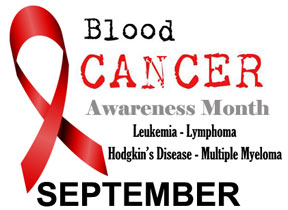September is Blood Cancer Awareness Month. Every three minutes, someone in the United States is diagnosed with blood cancer. It is one of the most common types of cancer, affecting the production and function of your blood cells. In most blood cancers, the normal blood cell development process is interrupted by uncontrolled growth of an abnormal type of blood cell. These abnormal blood cells, or cancerous cells, prevent your blood from performing many of its functions, like fighting off infections or preventing serious bleeding.
MOST COMMON TYPES OF BLOOD CANCERS:
LEUKEMIA
A cancer of the bone marrow and blood.
LYMPHOMA
A cancer that starts in cells that are part of the body’s immune system.
MYELOMA
A cancer of plasma cells, which are a type of white blood cells.
MYELODYSPLASTIC SYNDROMES (MDS)
Are a group of diseases of the blood and bone marrow.
MYELOPROLIFERATIVE NEOPLASMS (MPNS)
Are types of cancers that begin with an abnormal change in a stem cell in the bone marrow.
TREATING BLOOD CANCERS WITH UMBILICAL CORD BLOOD:
Did you know that umbilical cord blood can help treat people with certain life-threatening diseases, including some types of blood cancers? That’s because the umbilical cord contains something very precious: hematopoietic stem cells.
Hematopoietic stem cells are the immature blood-forming cells found in everyone’s blood and bone marrow. These little cells have an important job. They change into the red or white blood cells and platelets your body needs to stay healthy. But for patients with a bone marrow disease, the process doesn’t work properly. A bone marrow transplant is often the best chance of survival and a possible cure, and umbilical cord blood offers a potential source of the needed replacement tissue for the transplant. When it is used, this may be called a cord blood transplant. More than 35,000 transplants using umbilical cord blood have taken place worldwide.
Sign Up Today!
(It takes less than 5 minutes)
